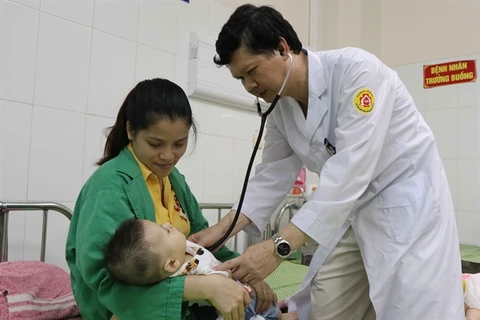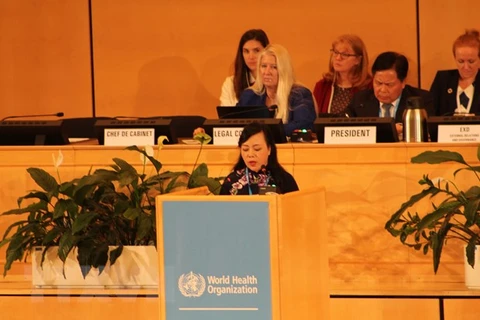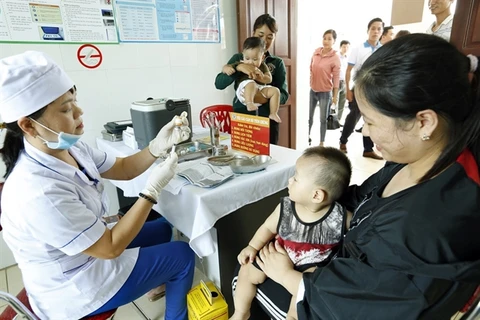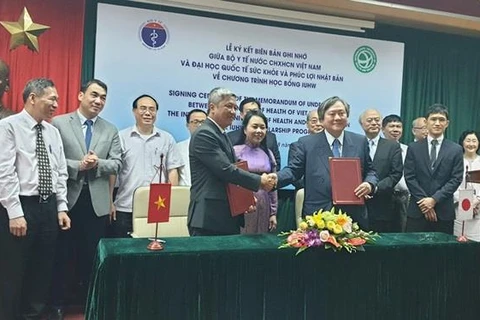Hanoi (VNA) – The health sector is facing challenges in renewing financial mechanism and improving hospital quality, Minister of Health Nguyen Thi Kim Tien has said.
As of the end of 2018, Vietnam was home to 39 central-level hospitals, 492 hospitals at provincial level, 645 at district level and more than 11,000 communal health stations. In addition, there are 222 private hospitals and about 31,500 private clinics.
Hospitals need to improve their quality to satisfy the increasing demand of people.
Training for medical staff is a strategic target
Minister Tien said the health sector is facing challenges in renewing financial mechanism and improving hospital quality. If leaders of health facilities only rely on their expertise while showing no creativity in their mindset and management skills, it will be difficult for them to attract patients. Especially now patients have the right to choose the better hospitals.
Improving education and training for health personnel and management staff in primary health care is among priorities to fulfil the Party and State’s national strategies and policies on building a health care system which meets the millennial development goals and the national target programme on building new-style rural areas.
Some necessary management skills include planning, monitoring, team work, communication skills, resources management (finance, ability, facilities and equipment) and medical services supply, among others.
Developing capacity standards to meet integration requirements
Dr Pham Van Tac, head of the personnel department under the Ministry of Health (MoH) said that in 2015-2018, under the Health Professionals Education and Training for Health System Reforms Project for Vietnam (HPET), the department joined hands with the Hanoi Public Health University and the Ho Chi Minh City-based Public Health Institute to carry out a number of training activities and devise legal regulations in the medical personnel training management.
The move aimed to renew existing training programmes to evaluate staff based on ability toward satisfying regional standards, he noted.
According to results of a survey on demand for management staff, the personnel department of the MoH and the Hanoi Public Health University teamed up with medical experts of France’s Rennes Public Health University to build and submit to the health ministry a document on basic leadership capacity standards in the sector.
The standards are designed to endow trainees with knowledge, leadership and management skills in the health system, as well as policies and strategies to foster the sector’s growth.
The health ministry assessed the new training programme in August 2017 and allowed its implementation from 2018.
Under the approved programme, training courses have been held in the northern and southern regions of the country.
Participants included incumbent and future leaders of the MoH’s units and health departments across the country, directors of hospitals and heads of preventive medicine institutes, among others.
To build this programme, the health ministry assigned the Hanoi Public Health University to collaborate with medical experts of French Rennes Public Health University in developing three sub-programmes on management targeting leaders and managers in the sector. Various workshops were held in order to collect opinions of health management officials, along with consultation with local and foreign experts.
The training programme comprised four phases. Participants attended lectures in the first three weeks to gain general knowledge and skills. They also joined discussions to improve necessary capabilities for management. In the second stage, they had a fact-finding trip in one week to examine and compare theory and reality at health facilities.
In the next phase, participants were asked to apply what they had learnt by assuming leadership in their own workplace in seven weeks. Afterward, they had one week to report and share their experience.
Lecturers were leaders of the MoH and relevant agencies, and from the public health university and institute in Hanoi and HCM City. Representatives of international organisations were also invited as guest speakers.
The programme received positive feedback from the participants, as it met the demand for integration and development of the region and the world./.

























